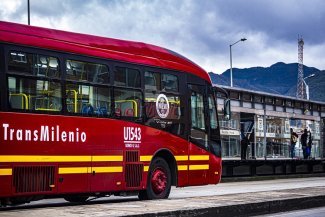Joséphine Shimbi Umba of the Trade Union Confederation of Congo (CSC) photographed in Cotonou, Benin on 1 September 2018.
Joséphine Shimbi Umba is vice president of gender, the informal economy and finance at the Trade Union Confederation of Congo (La Confédération Syndicale du Congo, or CSC). The Democratic Republic of Congo has one of the highest rates of informality in the world: according to the most recent World Bank figures, 81.5 per cent of workers in urban areas of DR Congo are informal, but according to the CSC, the informal economy represents an astronomical 97.5 per cent of all workers, which is significantly higher than the International Labour Organization (ILO)’s Africa average of 85.8 per cent.
Speaking to Equal Times at an international seminar organised by the ITUC, ITUC Africa, CSC - IIWE Belgium and World Solidarity on the future of work, the just transition and green initiatives held in Cotonou, Benin between 28 August and 1 September 2018, Shimbi Umba talked about her union’s notable work with informal sector market traders in the Congolese capital of Kinshasa to ensure a cleaner trading environment. In a city like Kinshasa, which is home to over 10 million people, an estimated 400 different markets and over one million market traders, engaging such workers to augment municipal services is just one example of the work Congolese unions are doing to incorporate informal workers. Shimbi Umba also discussed the importance of south-south cooperation as well as the importance of unions internalising the message of decent work and just transition.
Can you give us a general overview of the situation facing workers in the Democratic Republic of Congo?
Congo is a very big country with over 2,345,000 square metres of land and a population of over 80 million, of which over 65 per cent are young people. There is massive unemployment in the Congo, particularly amongst the youths. In 2012, we held a national forum on employment in the DRC and we discovered that only 2.5 per cent of Congolese workers had what you can call ‘formal’ jobs – everybody else works in the informal sector. If we unionists say we are here to protect the workers, which workers are we talking about if only 2.5 per cent have formal jobs? From there we started trying to see how we could really assist the country’s informal workers. It is a very difficult group to understand as it is made up of all kinds of workers in many different sectors: it could be someone who is an established entrepreneur but operating informally, but it could also be someone who might take some sugar and start selling it in front of his house. If you approach the latter, he wants to know what exactly are you putting him in a union for?
A few years ago, you teamed up with the trade unions in Togo to learn about how to organise informal workers. Can you tell us about your experience?
We really commend the efforts of our confederation who gave the support to go to the Trade Union Confederation of Togolese Workers (CSTT) who gave us strategies on how we could actually penetrate the informal economy. In 2014, a group of Congolese trade unionists went to Togo and we spent about three weeks there meeting the moto-taxi drivers, the fish sellers, the market traders and other kinds of informal workers. We really saw how happy they were to be in a union and how helpful the unions had been towards them. We saw some of the strategies they use in Togo and their very good practises, and we brought them back to the DRC to apply it to our local context. This has really helped us to penetrate the informal economy and as a result, we have been able to organise many informal workers into unions.
What was one of the key things you learnt from the Togolese?
One of the important things we learnt is that before you try to start organising informal workers, you first need to speak to the local authorities of that particular area. For example, for market vendors you need to go the head of the market. Then, you should try and pin point the person who is some sort of leader amongst the workers – there is always someone. You go to this person and you explain what you are trying to achieve for them and their peers. When we finally get to speak to the workers, we don’t just go and start talking about who we are. We first try to listen to their problems and find out what they need. Once they have welcomed us, only then do we start talking about unions. At that point, we bring them in, invite them to all of our meetings and our general assemblies, and we make sure that they participate so that they feel involved and they feel at home with us. These are just some of the things we learnt in Togo, although we ‘Congolised’ them!
Financial exclusion and a lack of social protection are both hallmarks of informality. Has your union been able to do anything on this front?
Well, another thing we saw in Togo is that they organised their members into mutual health centres and provided some sort of microfinance savings and loans services for them, so if anyone falls sick or if they have any money issues, they can approach the union for help. All they have to do is pay their monthly membership fees. And once you are able to do that for informal workers, they are not going anywhere because they will see the concrete benefits that come from being a part of the union. So, we started something similar in the Congo but we had to adapt it to our own situation because in our country, the stakeholders in the informal economy have very low purchasing power. We started by opening a savings and loans cooperative. Workers come with the little that they have and they make their contributions. We offer then long terms loans at very low interest rates to allow them to extend their businesses. After that, once they have accumulated some money, the next phase is to gather them into mutual health centres.
The seminar you have just participated in [in Benin] has been all about decent work and just transition in the Global South. What does, or could, this look like in a Congolese context?
It is still quite a new concept for us, but I can see that we need to have more people internalising the message of decent work and just transition. It is much easier to effect change when you are in large numbers. And the only way that we will be able to influence the government and politicians to make changes is if we first get our members behind us. People are already used to a particular way of life, so you not only need to change their behaviour but first you need to change their thinking. But we have the declaration [from this seminar], which can be integrated into our organisational policies, if our leadership is willing. We also have the CSC congress coming up which will really give us an opportunity to have a bigger audience for this message. But this seminar has underlined how important it is that we make these changes – not just for workers but also for the planet.
And finally, earlier this week you gave a really interesting presentation about the work CSC is doing with market workers in Kinshasa to ensure a cleaner trading environment. Can you share some of the highlights?
Plastic bags have been banned in Congo since 1 July 2018 but we still have a massive problem with plastic waste. So we have been working in two markets in Kinshasa – at the Matete and Liberté markets – to work with the traders to help clean it up. We work with our members and also some members of sellers’ associations to educate them about why it is important for both the sellers and their customers to have a healthy environment, we educate them about the environmental risks posed by plastic and we also assist market workers with sanitation cleaning on Saturdays. We try to show them good examples of waste disposal methods and other things they should be doing. Because when you see how dirty it is you realise that something has to be done. I remember one woman telling me ‘I am doing this cleaning because I do not want to get sick.’ The local government sometimes join us, even the market head joined us the last time we were there. They give us the tools and equipment we need but we also buy these tools for our affiliates, which comes from the money they contribute to the cooperative. But the major obstacle we face is what happens after the waste is collected because we don’t really have a recycling programme in Kinshasa. The local government trucks just take the waste from the market and dump it somewhere else, which is not right. The problem only affects a different community. But again, we are in contact with our Togolese comrades because they have a particular waste disposal system that we may be able to copy.










